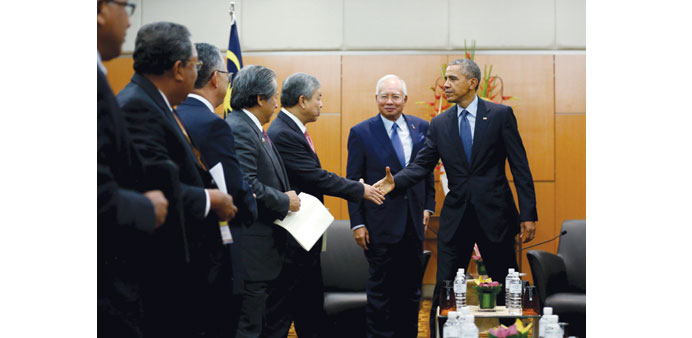US President Barack Obama greets members of the Malaysian delegation after a bilateral meeting with Prime Minister Najib Razak before the start of the Asean Summit in Kuala Lumpur.
Reuters
Kuala Lumpur
US President Barack Obama said summit meetings among world leaders this weekend in the Malaysian capital of Kuala Lumpur will focus on the global fight against Islamic State militancy and on the disputed South China Sea.
Speaking to reporters after meeting with Malaysian Prime Minister Najib Razak, Obama said: “Malaysia is part of the coalition to fight (Islamic State) and can be extraordinarily helpful on issues like countering the destructive and perverse narrative that’s developed.”
Malaysia deployed extraordinary security measures around Kuala Lumpur yesterday as leaders from 18 countries arrived for a pair of weekend summits amid fresh attacks by militants.
Malaysia’s police chief cited unconfirmed reports of an “imminent terrorist threat” in the country, following last week’s attacks in Paris and the downing of a Russian airliner over Egypt by Islamic State militants.
Some 4,500 soldiers were deployed or on standby to secure the summit, in addition to thousands of police who have fanned out around the Kuala Lumpur City Centre. The site is home to Petronas Towers, once the world’s tallest buildings, and a convention centre where the summits are taking place.
In addition to Obama, leaders from China, Japan, Russia, India, South Korea, Australia and New Zealand are attending the East Asia Summit following the annual Association of Southeast Asian Nations (Asean) meeting.
Shortly after Obama arrived, reports from the African nation of Mali said gunmen shouting religious slogans attacked a luxury hotel in the capital of Bamako, taking 170 guests and hotel staff hostage. It was not immediately clear who the gunmen were affiliated with.
Obama said the US was “monitoring the situation”.
The Malaysian prime minister said his government is setting up a centre for “long-term messaging” against Islamic State militancy using social media and other tools.
“Malaysia’s government is very clear we are against IS (Islamic State), against the ideology. It is evil. It is a perversion of Islam, and they do not represent us,” he said after his talks with Obama. The weekend summits would address issues of terrorist threats abroad and locally. “It’s important for us to present the authentic Islam,” Najib said after his talks with Obama.
In September, Malaysian police thwarted a plot to detonate bombs in Kuala Lumpur’s vibrant tourist area of Bukit Bintang, nearby the Petronas Towers. Most of the leaders are arriving from the Asia-Pacific Economic
Co-operation (Apec) summit in Manila. Both the Apec meeting and the Asean summit typically focus on economic issues but have been overshadowed by the attacks in Paris that killed at least 129 people.
Obama said the South China Sea “will be a major topic” for all the Asean countries.
“The US does strongly believe in the need to apply the rule of law and international norms in the resolution of maritime disputes,” Obama said. “Freedom of navigation and the free flow of commerce” have been the foundation for region’s growth.”
Beijing claims almost the entire South China Sea along with the atolls and islets scattered around its strategic sea lanes, which annually carry $5tn worth of trade. This clashes with claims by Taiwan and Asean members Vietnam, the Philippines, Malaysia and Brunei.
In talks with Philippine President Benigno Aquino on Thursday, Obama demanded China halt land reclamation work that is turning seven reefs in the Spratly archipelago into artificial islands. China is building airfields and other facilities on some of them.
Earlier this month, US B-52 bombers flew near the islands, signalling Washington’s determination to challenge Beijing over the disputed sea.
China said it does not want the South China Sea issue to be the focus of the meetings in Kuala Lumpur.
Obama promised students at a town hall meeting at a Kuala Lumpur University that he would raise concerns about corruption and Malaysia’s crackdown on dissent in his meeting with Najib.
Critics have accused Najib of escalating a crackdown on dissent and free expression after losing the popular vote in the 2013 general election. The prime minister has come under pressure himself after it was revealed in July that nearly $700mn in unexplained deposits were placed into his personal bank accounts. He has denied any wrongdoing but has yet to detail the source and purpose of the money he received.
Obama said he talked with Najib “about the importance of civil society”. A US official said Obama privately raised issues of human rights, corruption and freedom of expression with the Malaysian leader.

